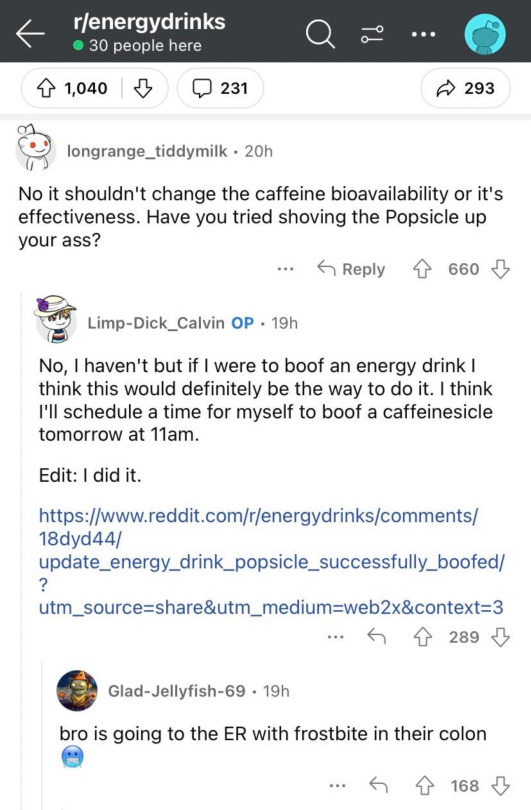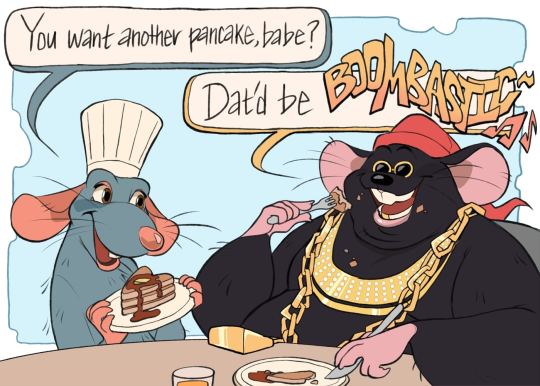inouerealm
817 posts
Gender essentialists don't talk to me
Don't wanna be here? Send us removal request.
Text
when i say “that reminds me” & theres zero connection you just have to take my word for it theres no time to explain
154K notes
·
View notes
Text
“nobody is making you do this” i am driven by unnatural forces you will never even begin to comprehend
79K notes
·
View notes
Text

I swear I get sad if I wake up and one is on the floor
191K notes
·
View notes
Text
Cats getting caught doing crimes
127K notes
·
View notes
Text

some old vent art. wow almost a year ago. my entire life since jan 2021 has been me breaking down and deconstructing.
115 notes
·
View notes
Text
it seems to me that there are currently 4 main concept stories being told in parallel in psychiatry, and that a lot of the controversies within psychiatry (among psychiatrists and among the psychiatrised or potentially psychiatrised) are about contesting the boundaries of each. of course the claim is that everything is equally 'bio-psycho-social' but we know that is not really so. these 4 in my view being these:
1) 'biological illness' explanations for 'classic psychiatric illnesses' like schizophrenia, schizoaffective, bipolar disorder, as well as some kinds of severe, psychotic, 'innate', 'unipolar depressions. the idea here is that it is no one's fault, that perfectly well-adjusted people who had no adverse experiences whatsoever and have made no mistakes of living at all can develop these, though environment and certain choices can make it more likely, but environment then always is just the trigger, never the actual cause, the actual cause being genetics that just happened to be. lots of psychiatrists feel a special interest in these and a special claim to these. often, it is bemoaned that psychiatry has come to involve itself into myriad 'life problems' of the 'worried well' and should refocus itself on the actually sick, them being this group.
the necessity to fight an illness that will get worse the longer it remains 'untreated' (=unmedicated) is named to justify coerced medication and psychiatric violence, the idea being that the longer an episode (esp. first episode) remains unmedicated, the worse the 'outcome'. the treatment of these 'illnesses' is medication foremost, as well as other biological treatments like electroconvulsions and psychosurgery, as well as 'containment' of the person until these treatments show effect. anything else, no matter the good talk had on their importance, is fundamentally secondary. i.e. it would be good if every psychotic had psychotherapy and myriad other forms of help as well, but if the resources aren't there, well then. but it would be considered a litigable medical mistake to not give medication, forcefully if need be.
this type of coercion is actually not specific to psychiatry, in emergency or intensive medicine, people who are 'agitated' because of delirium, or are incapable of consenting because of unconsciousness, get full treatment, except if they gave prior healthcare directives (very common in my country) to the contrary. i.e. someone plucking at their i.v. lines and struggling against their bed while septic and delirious will get sedated or maybe even restrained or maybe even put into narcosis until i.e. their antibiotics took effect. psychiatry maps on to this, claims the same logic.
2) 'neurodevelopmental' / 'neurodivergence' explanations for autism, adhd, dyslexia, and sometimes other concepts i.e. 'psychopaths', increasingly ocd. the idea here is that some people's brains are 'wired differently' causing fundamentally different ways of experiencing the world. these disorders should therefore have been present since childhood (since birth in fact), which also explains why adult diagnosis necessitates 'childhood proofs'. the dopamine system is often cited here. also executive functions and their biological variants. here, too, it is 'nobody's fault', specifically not the parents. the disablement that results from these differences is often explained at least partially through societal explanations. ("back when hardly anyone read and wrote this disorder didn't exist" "if children and people didn't have to sit still and work at a desk for long stretches of times this wouldn't be such a problem" etc). evolutionary psych is also beloved here, as in the idea that being 'wired differently' thus confers both advantages and disadvantages for the individual as well as for our species. lip service is often paid here to neurodiversity advocacy, or that language is used, specifically for autism and adhd.
frequently i witness an attempt to have it both ways in term of pathologisation: these are real disorders, it is insisted, that in case of adhd at least, can be helped efficiently, thus 'stigma must be reduced'. but also, a lot of psychiatrists bemoan that 'everybody nowadays wants to have adhd or autism', bemoan the influx of people searching to professionally validate their self-diagnosis. the assumption here is that people labelled so or trying to claim these labels are not really sick, that back in the old days in fact nobody would have made such a fuss and neither should those afflicted. often the assumptions is that people who actually have problems of personality, or 'psychological problems' are seeking 'neurodivergence' as excuse, or because they fail to reflect on their actual problems. some psychiatrists will see adhd and autism everywhere and some will see it hardly anywhere.
in the meanwhile, the 'neurodevelopmentally born-wired different' group also includes intellectually disabled people and the kind of autists who are deemed mentally incapable of inhabiting a fully human social role and so are controlled, coerced, institutionalised, etc. unlike the 'psychiatric illness' group these are considered 'disabled' foremost, not to be cured and treated, but managed, (preferably by a non-psychiatry profession). of course, there's overlaps to the first group, i.e. 'neurodevelopmental' paradigm for schizophrenia and the management of schizophrenics that are 'chronic' and 'severe'.
3) 'trauma'. some disorders are defined through trauma, obviously PTSD, and some are historically strongly linked to trauma theory and research, i.e. DID or 'structural dissociation'. some psychiatric concepts frequently discussed in the context of trauma include borderline personality disorder and personality disorders generally, depression, 'addiction', but also actually psychosis and psychotic disorders.
the situation here, it seems to me, is that trauma hypotheses are always highly contested (see: the insistence that DID specifically is iatrogenic, a discourse that isn't had to this extent about other psychiatric diagnoses; the widespread upset over trauma being 'a fad'; the view that ptsd specifically is socially and historically constructed as more mainstream than extending this to all psychiatric categories; the way there's so much literature on trauma theories of psychosis but they have hardly any impact on how psychotics are treated in psychiatry currently) but they do have their fans.
these trauma-affine psychiatrists are more likely to see themselves as activists for the traumatised. they might protest certain psychiatric practices, insist that psychiatry should be more 'trauma informed'. they might question medication use. they will cast a wider net and understand many, but never all, psychiatrised troubles under the concept trauma. these psychiatrists for instance might be willing to understand psychosis and schizophrenia as structural dissociation or trauma based (though whether they actually work with people so psychiatrised that are actually 'difficult' is another question), and they will probably talk of the impact of trauma on depression, addiction, eating disorders, maybe also the disorganisation that gets labeled adhd, and so on.
but there's still trauma and non-trauma, and a lot of the literature then is about how to define the boundaries of trauma. there's DID and there's pseudo-DID. there's complex ptsd and there's 'merely' borderline pd which might or might not be trauma-based but is also kind of innate. lots of trauma fans are willing to imagine pathologised villains who hurt their traumatised patients (the narcissist, the psychopath, etc). psychosis can be trauma-based but certainly not always (?). lots of trauma fans also assume there's a kind of being mentally ill that puts someone beyond the scope of trauma therapy. there's also, as with autism & adhd & co, much bemoaning of the inflationary use of 'trauma' and a struggle with the cultural allure of trauma. the allure of course being that it's a professional and thus powerful validation that you have been harmed and wronged, a validation of injustice suffered.
as in psychiatry generally, there is much interest in biological validation. the idea is that trauma memories are neurobiologically 'different' from other memories. that trauma causes provable neurological disruption. cue beautiful fmri pictures of amygdalae and hipoccampi and bessel can der kolk's everything.
because trauma explanations are alluring but limited (not everything is trauma, not everyone is truly traumatised, or if we 'all' face trauma only some face severe trauma that affected them in ways that matter, some people are survivors-victims and others are not, it matters if you actually experienced certain things or didn't, trauma therapy for you but not you) the psychiatrised onlookers often develop a complicated, sometimes jealous, relationship to this concept, both those that have been granted or are able to personally access a 'trauma-explanation' and those that are being excluded from it.
4) 'psychology' / 'neurosis' / 'problems of living'. the idea here is that the mentally ill person is a primarily 'normal' person who developed a problem, because they struggled psychologically with the demands put on them, or with life.
often the idea is that a disorder starts with a few bad habits or bad decisions but then develops a dynamic of its own, eventually causing illness and disability. 'addiction', for instance. but also eating disorders that might start with mere 'dieting' and 'problematic beliefs' and then develop a dynamic of their own. anxiety and panic disorders that get 'reinforced' by 'avoidance'. personality disorders are also understood like this, though the problem is considered particularly insidious: not just some aspects of how you live, but fundamentally how you are as person. 'depression' here is seen as a human and natural reaction to certain circumstances that then gets entertained by social retreat, avoidance, unhelpful thoughts, etc. there's usually both psychodynamic and some behavioralist explanations for the underlying psychology, increasingly these ideas get somewhat combined anyhow. there's an interest for systemic and societal explanations. 'attachment' is also big here. in consequence, psychotherapy is seen as fundamentally important to treating these disorders. medication 'can help' and should be offered since it's 'readily available' while psychotherapy often isn't, but it's a fact that is bemoaned.
while acknowledging the overlaps, there's a desire to separate this group from the trauma group, in that adversity is not = trauma, or in that relatively 'normal' problems can cause much psychological disturbance as well, if a person fails to handle them well. trauma theorists specifically often on the one hand insist to not overlook trauma, on the other hand 'defend' trauma from 'inflationary use', and push back against the merely psychological problems/neurosis/problems of living group trying to 'overidentify' with trauma. the issue then is not 'trauma' but, say, entitlement, pride, avoidance, unrealistic expectations, failures to deal with normal life events, etc. sympathy is to be found for the factors that influence your troubles (societal expectations here, parental expectations there, inborn personality traits, etc) but you're no one's victim but your own.
all this not to imply that biological explanations are less beloved here; they are: evolutionary psych is big here as well, as well as physiological/biological explanations for what keeps happening, or what locks people in their 'bad habits'. (sympathic/parasympathic activation, dopamine again, etc). all schools of psychology are increasingly interested in connecting and validating their ideas with biological findings. ('neuropsychotherapy' 'the neuroscience of psychoanalysis', etc). there is also much interest for 'genetic vulnerabilities'. maybe some people are genetically more likely to become alcoholics. maybe some people are genetically more vulnerable to become anorexics, in fact, maybe only a specific type of person can become anorexic, and maybe anorexics once were important for species survival (evo psych again), but maybe also not.
but unlike 'neurodivergence' and unlike 'actual severe mental illness' the idea is that we are all vulnerable to this. not all of us are autistic, yes it's a spectrum bu either you have a brain like this or you don't. not all of us are bipolar, this is a serious serious mental illness. but anyone can get depressed, or anxious, or develop a drug habit of eating disorder, or grow to have a disordered personality.
therefore, while people labelled so can become extremely extremely disabled (i.e. a 'hypochondric' or an 'agoraphobic' that are near fully incapacitated by their troubles, i.e. anorexics or addicts dying) there are quite a lot of psychiatrists that will maintain these are troubles that are not 'genuinely' psychiatric; troubles that could be better solved by religion, or morality, or a psychologist maybe.
in terms of actual material effects on life, this is an extremely heterogenous group (as are all these groups btw), that includes lots of well-behaved, productive workers that are distressed as well as lots of extremely disabled, disruptive, troublesome people, therefore the divide made between the 'serious mentally ill' and the 'problems of living' can be confusing.
but even towards the most troublesome and disruptive, that is, the ones that have cops called on them, that are hospitalised in a flurry of violence, that must be managed and contained (i.e. some addicts, some anorexics, some borderlines, etc) the assumption remains that their problems are mainly 'problems of living' and resentment towards this group specifically that isn't 'genuinely sick' but mostly 'misbehaving' is common among psychiatrists.
i think all of us are at least vaguely aware of these differing stories and interact with them, or are briefly offered them, potentially all of them, at different times, by different psychiatrists, or by fellow psychiatrised and 'self-help'', and quite a lot of struggle can be found in grappling with these and the question of how to fit oneself and one's experiences into all this.
50 notes
·
View notes
Text
u ever think about how some mental health disorders literally have criminal activity as a criteria…like not even pretending just straight up “if you don’t follow the laws of the state you’re insane” hmmm wonder why that might be
5K notes
·
View notes
Note
How was it “always allowed” if you people’s goal is for there to be no more therapists? That makes no sense. Your whole deal makes no sense and is fucking scary to me. And I’m a leftist but everything you stand for is TOO MUCH. “Anti recovery” this and “substance abuse should be allowed actually” that. I’m broken and I want to be fixed. No amount of “community” from inexperienced everypeople is gonna fix that. You know who CAN fix that? A fucking doctor. Some fucking pills. My mind is a prison and I’m gonna get out of it the normal way thank you very much. Yes, the normal way should be free and come from people with real compassion who aren’t abusive. No, people should NOT be encouraged to just wallow in their symptoms as if it’s normal and just who they are. I hope you all get better in every sense of the word…
Who exactly do you think is stopping you from getting the medicine you believe will improve your quality of life?
Really, who?
Do you think it's psych abolitionists? No, we're the ones trying to break down the gatekeepers and barriers that are keeping you from accessing the drugs you choose. The ones you sneer at for saying "substance abuse should be allowed actually."
Psychiatric authority backed by government power: "People should be required to take the drugs we believe they need, but if they take drugs we don't believe they really need, that should be banned." Cognitive liberty advocates/psych abolitionists: "That's an incredibly oppressive policy. What drugs an individual chooses to take or not take should be xyr own choice, neither mandated nor prohibited by state power." You, gatekept by medication you want under the system you support: "Why would psych abolitionists do this to me?"
I know, I know. But it's not substance abuse! You want those pills for LEGITIMATE MEDICAL reasons, not like those OTHER people who want medications for ILLEGITIMATE reasons and are RUINING IT FOR EVERYONE -- Yeah. It doesn't matter. If you don't have a Permission Slip for a medicine, you can't get it. If you do have a Permission Slip, you can. If you have an Order Slip, you have to. "Legitimate medical reason" just means "with permission," while "substance abuse" just means "without permission."
I know, I know. "How dare you equate my desire for Legitimate Medical Medication with that Substance Abuser who just wants to get high! That's so offensive!" -- I'm not the one equating y'all. The government is. Medical authority is. Psychiatry is. Both you and party animal guy who wants to get high for "no medical reason" are people who face barriers, gatekeeping, and criminalization to accessing substances you want to access. Now, are you going to keep looking down on that partying, high-getting, "substance abuser" in order to lick the boot of the authorities denying bodily autonomy to you both? Or are you going to grow some class solidarity and oppose your actual enemy, the medical gatekeeping system?
As for "there to be no more therapists," actually the more common goal is for there to be no more therapists in power. Abolishing psychiatry wouldn't necessarily mean that in the post-psychiatry society there would be none of what are currently called "therapists," any more than religious freedom necessarily means that there are no clerics. They would just have no power. They would have no authority, except what an individual chooses to cede to them on a voluntary, individual, revocable, case-by-case basis.
If you assume that, without legal, cultural, economic, or medical authority pressuring or coercing people to defer to therapists, no one would do so... well, that's not an assumption that makes therapists sound very good, is it?
45 notes
·
View notes
Text

Stormé DeLarverie joined the Jewel Box Review in 1955 as a male impersonator. Stormé and 25 female impersonators- Black, Asian, Native, and Latina- performed in theaters from Mexico to Canada, in cities large and small, and toured the segregated south during the fifties and early sixties. Would you prefer people refer to you as he or she? I tell people, "Use whatever makes you comfortable." A sad song doesn't care whose heart it breaks. But there's no use in singing any sad song. [At age fifteen] I got beaten up badly by two gangs- twice. My grandfather told me if I didn't stop running, I'd be running all my life. I stopped running, and I haven't run a day since. I got scars all over my body. My body is 40 miles of bad road. Some of it wasn't at work; it was on the street- like helping some elderly person getting attacked; you can't walk past that. I grew up in the Bayou, and you know we swamp fighters are a lot different than street fighters. I'm like a gator. . . quicker, faster, and unpredictable. It really doesn't matter whether you're male, female, gay, straight- whatever you want your identity to be—no one has the right to try to take your life or to beat you down for it. They do not have the right. It started with that Stonewall. They call it a riot, a rebellion-it was civil disobedience. They were banged and bruised and some were put in jail. But everybody got tired of being pushed around, of being raided. The cops got the surprise of their lives-those queens were not going to take it any longer. I walked into it. I was coming around the corner and got hit right dead in the eye. I got in a few hot licks against the cops. I have no regrets. If I did, I wouldn't have lived this long.
— Transgender Warriors: A Movement Whose Time Has Come by Leslie Feinberg (1996)
310 notes
·
View notes
Video
Southern Comfort (2001)
A beautiful scene featuring transgender man Robert Eades and his transgender girlfriend Lola.
189K notes
·
View notes







